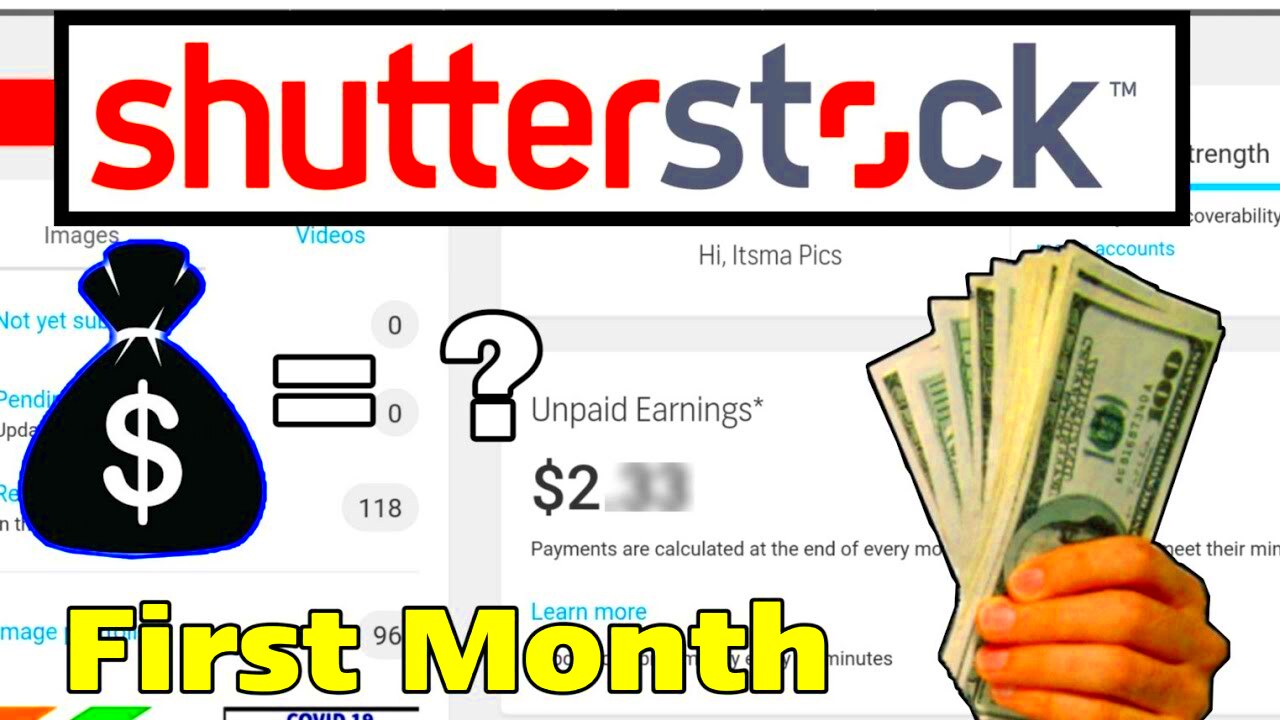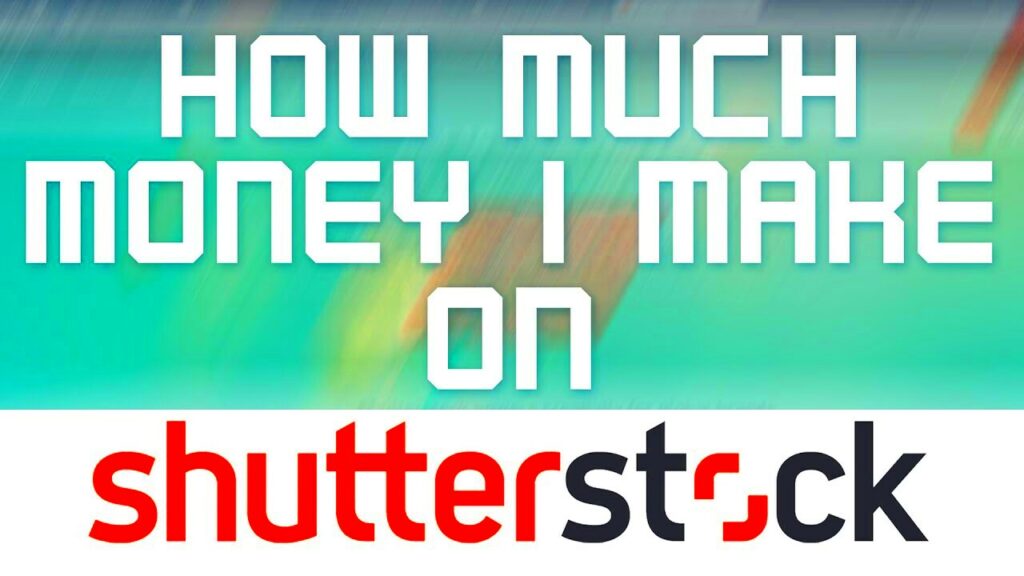To Shutterstock's enormous library, you can upload your content once you sign up as a contributor. Each time a customer downloads your work, you will get a commission from each sale. The various methods that Shutterstock uses for selling to its clients; via subscriptions, on-demand purchases or via customized licenses have different effects on what a contributor receives for each download. Nevertheless, in addition to this the chances of making higher income increase with increased uploading of more content and its successful performance standards.
Factors That Affect Earnings on Shutterstock

Not every Shutterstock contributor takes home the same pay check. This is due to several reasons that determine how much you can earn on that platform:
- Type of Content: Some content types, like videos and illustrations, tend to earn more than photos because they are in higher demand or have fewer competitors.
- Content Quality: High-quality, professional-looking images or videos tend to attract more downloads. Ensure your content is well-lit, sharp, and meets Shutterstock’s quality standards.
- Keyword Optimization: Properly tagging your content with relevant keywords increases its visibility. The better your keywords match what users are searching for, the higher the chances your work will be found and purchased.
- Upload Frequency: Regularly uploading new content keeps your portfolio fresh and increases your chances of making sales. Contributors who upload more frequently tend to earn more.
- Global Trends and Demand: Content that aligns with current trends or seasonal demand is more likely to be downloaded. Researching what's popular can give you an edge in choosing which content to create.
By comprehending these aspects, you will be able to enhance your profits as well as make your Shutterstock portfolio a more dependable source of income.
Also Read This: Logging Devices Out of YouTube and Enhancing Your Account Security
Earnings Based on Licensing Models
Different licensing models are offered by Shutterstock, and each of them affects your earnings from the content that you create. Here’re the key licensing types:
| Licensing Model | Description | Contributor Earnings |
|---|---|---|
| Subscription License | Customers pay a monthly fee for a certain number of downloads. Your content is licensed to them as part of this subscription. | Typically results in lower earnings per download, but high volume can compensate for this. |
| On-Demand License | Customers purchase a set number of downloads, which they can use within a specified time. | You earn a higher amount per download compared to subscription models. |
| Enhanced License | This license gives customers broader rights to use your content for commercial purposes, such as in merchandise or large-scale campaigns. | This is where contributors earn the most, as the license allows for more extensive use of your work. |
| Custom License | Tailored licenses for specific needs, such as exclusive content rights or specialized media. | Highly variable, but generally offers the highest earnings per download. |
It is evident that the revenue you generate is directly influenced by the type of licensing model that your customer selects. On one hand, there are subscription licenses which can lead to a more regular flow of sales as opposed to advanced and individual licenses that have the possible advantage of higher income per download.
Also Read This: How Much to Buy Photo from Shutterstock
Understanding Shutterstock Royalties
To make money using Shutterstock, comprehension of transfer payments is essential. Transfer payments refer to the money that is paid when other people download different pieces of your material. The royalty structure in Shutter stock is classed in levels; therefore, as you upload new media and achieve specific goals, your revenue increases. This is likely to spur them on!
This is a brief explanation of the usual way in which Shutterstock royalties operate:
- Base Royalties: When you first start, you might earn a base royalty of around 15-20% for each download. This percentage can vary based on factors like the licensing model and the type of content.
- Tiered System: As you accumulate sales, your percentage may increase. For instance, if you reach a certain number of downloads, you might move to the next tier, earning a higher percentage (up to 40% or more).
- Content Type: Videos and editorial images often have different royalty rates compared to standard images. Understanding which type of content earns better can influence what you decide to upload.
If you make yourself cognizant of how it operates in terms of royalties and also seek to get as many downloads as possible; in due course you will have increased your income greatly. You should monitor your achievements so that you can tell when to move up these levels!
Also Read This: Closing Your EyeEm Account: A Step-by-Step Guide
Maximizing Your Earnings on Shutterstock
How can you get the most money from Shutterstock? That's all about having a plan and being good! Here is some helpful advice:
- Focus on Quality: Always prioritize high-quality images. Make sure your work is sharp, well-lit, and visually appealing. Quality matters!
- Keyword Your Content: Use relevant keywords and tags when uploading. This will help users find your work more easily and increase your download chances.
- Stay Current: Pay attention to trends. Seasonal or trending topics can drive more downloads. Create content that aligns with what’s currently in demand.
- Diverse Portfolio: Try to upload a variety of content types—photos, videos, and illustrations. A diverse portfolio can attract a broader audience.
- Regular Uploads: Consistency is key. Regularly upload new content to keep your portfolio fresh and relevant.
The implementation of these techniques would improve your visibility thus attracting potential buyers leading to more downloads as well as increased revenue.
Also Read This: How to Take Photos for Shutterstock and Meet Their Standards
Payment Structure and Minimum Payouts
A contributor must be knowledgeable about how taxes are paid on Shutterstock so that he or she can take care of finances properly. Payment systems on the platform are very simple and involve some key aspects:
- Minimum Payout Threshold: You must reach a minimum earnings threshold before you can withdraw your funds. This amount is typically around $35.
- Payment Frequency: Payments are usually made monthly, but only if you have reached the minimum payout amount. If not, your earnings will roll over to the next month.
- Payment Methods: Shutterstock offers various payment options, including PayPal and bank transfers, allowing you to choose the most convenient method for you.
- Tax Considerations: Be aware that Shutterstock may withhold taxes on your earnings depending on your location. Make sure to consult a tax professional to understand how this affects your income.
When you consider these factors when planning your finances, you are able to make better choices about how much to contribute. Moreover, if one understands the payment system well, it will be easier to establish feasible income targets.
Also Read This: How to Edit the Grid in Behance
Common Misconceptions About Shutterstock Earnings
Many assumptions about making money through Shutterstock can make it hard to see clearly on the expectations in mind. For better comprehension of the working of this platform plus what you can really get when it comes to earnings one needs to differentiate between truths and lies. It is time we demystify some popular fallacies!
- Myth 1: You Get Rich Quick: Many people think they can upload a few images and make a fortune overnight. In reality, building a successful portfolio takes time, effort, and consistency.
- Myth 2: All Contributors Earn the Same: Earnings can vary widely among contributors. Factors like content quality, market demand, and upload frequency play significant roles in determining income.
- Myth 3: Only Photographers Make Money: While photography is popular, illustrators and videographers can also earn well on Shutterstock. The key is to provide high-quality, in-demand content across various media types.
- Myth 4: Once You Upload, You’re Done: Simply uploading your content isn’t enough. You need to actively manage and update your portfolio to maximize visibility and downloads.
- Myth 5: You Can’t Control Your Earnings: While market trends do affect sales, you have control over the quality and type of content you create, which in turn can influence your earnings.
By knowing these misunderstandings, you will be able to manage your expectations accordingly and map out a more productive plan for victory on Shutterstock.
Also Read This: How to Set Up Rumble for TV Viewing
Frequently Asked Questions
When you are facing the Shutterstock platform, you might be having queries. To assist ease any confusion, given below are a few of the most commonly asked questions:
- How much can I expect to earn? Earnings vary widely depending on factors like content type, licensing, and your portfolio size. Some contributors earn a few dollars, while others make a full-time income.
- How often will I get paid? Payments are usually made monthly, provided you meet the minimum payout threshold of around $35.
- What types of content sell best? High-quality images, videos, and vector illustrations tend to perform well, especially those that align with current trends.
- Do I need a model release? If your work features recognizable people, you generally need a model release to sell it commercially.
- Can I sell my images elsewhere? Yes! You retain the rights to your content and can sell it on other platforms, but keep in mind that exclusivity may offer better royalties.
With these FAQs, you ought to feel at ease as you embark or further your career as a contributor to Shutterstock.
Conclusion
To max out, one can make money through the platform called Shutterstock where creative persons are able to upload their works of art. You have to know how the system works in order to tell how much you will be paid, which factors may affect your income and what things are not true about this process most people think is true but wrong. Above all, maintain quality, be up-to-date with trends and periodically refresh your portfolio. With great patience and commitment, turn your love for photography or illustration into a viable source of additional income. Go create!
